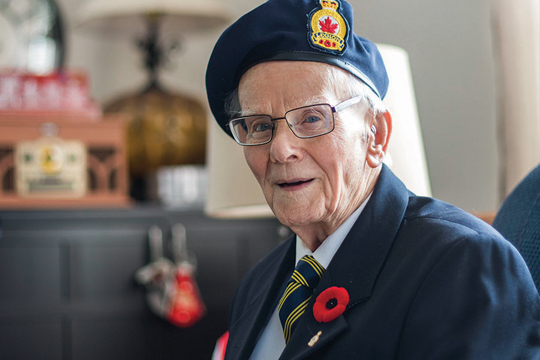
Burd Sisler, a Second World War veteran and career customs officer, has been retired longer than he worked.
Burd Sisler has seen it all. Sometimes in duplicate. He was born during the First World War and served in the Second. He survived the 1918 influenza pandemic and, more than 100 years later, has managed to stay safe during COVID-19.
He worked 27 years for the federal government, in customs at the Peace Bridge that connects Fort Erie, Ont., with Buffalo, N.Y., but has been retired 41 years.
“I’ve been retired for longer than I worked,” laughs Sisler, a trim, soft-spoken 105-year-old.
From his home in Fort Erie, he can almost see the bridge. Just up the road is the fort from the War of 1812.
He was 28, and he and his late wife, Mae, had one child when he joined the army in 1943 (they eventually ended up with five children.)
He wanted to join the air force, but his eyesight didn’t measure up — “my depth perception wasn’t very good and they worried about losing the aircraft when I would come in for a landing,” he jokes.
Instead, he joined the army, ending up on a crew based in Canada working with predictors, an early fully automated anti-aircraft system that used wind velocity, speed and humidity to track incoming bombers.
After that, he was transferred to radar, still a fairly new field. He made it through the war uninjured, but his brother, Louis, lost his leg to a landmine that killed another Canadian.
“You might say somebody was looking after me,” says Sisler. “I came back and I’ve stayed here in Fort Erie ever since.”
He co-owned a radio and TV repair shop for four years, then joined the Department of Customs and Excise in 1952.
“It was a steady job, though it didn’t pay too much,” just $1,800 a year, he remembers.
His son, Norm, who sat in on the interview, also worked for Customs and retired after 32 years. He is also a Federal Retirees member. He chuckles at his dad’s pay that first year: “Our raises were $1,800 a year.”
Most of Sisler’s time was spent in what he called the long room, as an accountant looking after files. He spent some time on the inspection line, though.
“I met a lot of interesting people,” he says. “There was, I remember, one who drove up and I said, ‘Good morning Mr. So-and-so — I forget what his name was — and he looked at me and said, ‘how do you know my name?’“
I said, ‘I’m a customs officer. I have to know quite a little bit about different people.’ I never did tell him how I found out. On the backseat, there was a suitcase with his name on it.”
By the time he was ready to retire in 1979, he was an appraiser. By then, customs and revenue had been separated into different agencies.
“That’s one reason I wanted to get out,” he recalls, adding the appraiser jobs were being moved 90 kilometres away to Hamilton.“They wanted me to carry a gun, and I didn’t want anything to do with it. A whole gang of us got together and said we didn’t want to do it.”
And then, the inevitable question: What’s his secret to a long, healthy life?“
I don’t know,” he says with a laugh. “I try to dodge depression. I never started smoking, that’s the main thing. Not at any time.”
After he stopped working, he joined book and science clubs. He was a teacher with the adult literacy council and bowled regularly until a few years ago. He has a box full of poems he wrote for each of his 35 grandchildren.
“It’s his mind,” Norm says. “He’s on the computer a lot, his mind’s active. It keeps him going; I really believe that.”
He pauses: “And he likes to eat.”
Gord Howard is a writer based in Fort Erie, Ont. He has worked as a newspaper reporter and editor for the past 35 years.

